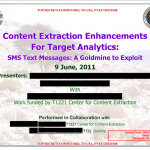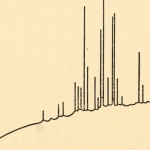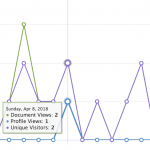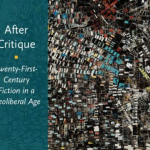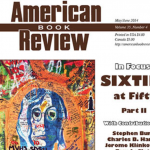2025
Rettberg and Rettberg discuss Jill's new book on machine vision and, in doing so, cover the mythological origins of surveillance, cybersemniotics, and the role of fear in the technologization of Western society.
2024
Lea Laura N. Michelsen reviews Machine Vision: How Algorithms are Changing the Way We See the World by Jill Walker Rettberg. Machine vision is all around us, for good and bad, but who has the power to influence how we use it?
By engaging with Colin Koopman's work on the politics of information, Stephan Paur has a look at the technologically sophisticated ways that human beings are now at the mercy of our datasets. Rather than inhabiting a physical, populated place and taking part in communities, “the informational person” is increasingly outsourced into such things as birth certificates, personality profiles, racialized credit and other extractive ideologies.
2021
In his essay, Malthe Stavning Erslev approaches the notion of post-digital from the perspective of a broader cultural phenomenon of posterioriy, emphasizing the fact that the prefix post- still allows for discussion of multidirectional and complex changes that our world is currently undergoing. In order to better grasp all the complexities and interrogate somewhat linear periodization implied by the prefix, Erslev employs the oxymoronic concept of contemporary posterity. At the same time, he ties his theoretical proposition with the extensive analysis of an online community engaging in bot-mimicry.
Building on their concept of metainterface, Søren Bro Pold and Christian Ulrik Andersen analyze the change in perception and experience that bring forth the always-on(line) mode of engaging with digital content. The notion of ‘spectacle’, in itself having a long history in critical theory, is employed here to discuss media politics and the struggle for power in terms of aesthetized computation, with their main driving forces being data analytics, surveillance and forensics. Pold and Andersen uncover how metainterface spectacle can also serve to empower political agency through reclaiming the apparatus.
2018
Beginning as a talk delivered at the National University of Kyiv-Mohyla Academy, Ukraine May 17, 2017, now edited and amplified for publication in the electronic book review and the 2018 collection of ebr essays forthcoming from Bloomsbury Press.
2017
"More is not necessarily more. Faster is not necessarily better. Big data is not necessarily better." In the effort to capture and make available data about people, digital humanities scholars must now weigh the decisions of what and what not to share. Geoffrey Rockwell and Bettina Berendt address the new ethical issues around “datafication” in an age of surveillance.
"Even among the Greeks and Romans, the most advanced nations of antiquity, money reaches its full development, which is presupposed in modern bourgeois society, only in the period of disintegration."- Karl Marx, Introduction to A Contribution to the Critique of Political Economy
In this review of Henry Turner’s The Corporate Commonwealth, Thomas considers how Turner historicizes the term “corporatization” to explore its wide-ranging definitions and functions in early-modern England.
The Corporate Commonwealth: Pluralism and Political Fictions in England, 1516-1651 Henry Turner, Chicago UP, 2016
In this review of The Power at the End of the Economy, Lestón delineates the theoretical apparatus of Massumi's book and its possible implications.
In this review of Mark Seltzer’s The Official World, Ulmer reflects on the interdependence of “the official” and “the unofficial” in contemporary constructs of reality.
How might literary databases be seen as alternatives to the commodification of academic scholarship in for profit, subscriber platforms? Scott Rettberg and Joseph Tabbi discuss issues related to instrumentality, the global marketplace, and the digital humanities.
Investigating the question of whether academics should be concerned that Academia.edu is not an educational institution, Johannah Rodgers finds that the answers depend on your definition of “education” and which parties you ask.
In this review of Mitchum Huehls’ After Critique, Smith situates Huehls' “ontological approach” to the study of contemporary literature as arising from and standing in opposition to the "zombie plague" of neoliberalism.
If the 1984 Ghostbusters film can be read as an early foreshadowing of the neoliberal transformation of the United States of America, how might the film’s 2016 sequel be interpreted? Ralph Clare reviews the new film in the context of his reading of the original in his 2014 book Fictions, Inc.
Analyzing the long and complex history of the term corporation, Turner explores the possibility that the term's roots in the universitasmight serve as a basis for a re-translation and re-valuation of the corporate concept and establish a ground, both discursive and practical, for a reassessment of the “political” as a process of imaginative transformation and collective action.
In a review of the contemporary publishing marketplace in the U.S. and the many definitions of "corporate fiction," Di Leo, editor of the American Book Review, offers some insights into the new economics of digital publishing and how ABR's recent decision to partner with ProjectMuse ended the "online poaching" of the magazine's content.
In this review, three social conditions of the Precarious (“precariousness, precarity, and (governmental) precarization”) are described. Furthermore, the neo-liberalist use of self-regulation as a means to exert control over individuals is exposed. The possibility to turn precarity into “a form of political mobilization,” as suggested by Lorey, is also explored.
2015
In this essay, Laura Shackelford reviews Jeffrey T. Nealon’s “Post-Postmodernism.” Not merely an historical supplement to Fredric Jameson’s “Postmodernism,” but an attempt to devise a new critical method appropriate to our “just-in-time” present, Shacklford discusses its implications for literary practice in the 21st Century.
2013
In his review of Christian Moraru’s recent Cosmodernism: American Narrative, Late Globalization, and the New Cultural Imaginary, Aron Pease considers the merits of the periodization advanced in that work. Ultimately, Pease argues that while the emphasis Moraru places on cosmodernism literature’s “relationality” means that the it is able to “register ‘the other’ as a concrete and organizing presence rather than as an abstract theme”, Moraru’s reliance on the nebulous term “globalization” fails to account for the extent to which the literature characterized as cosmodern reflects the political economy of late capitalism.






